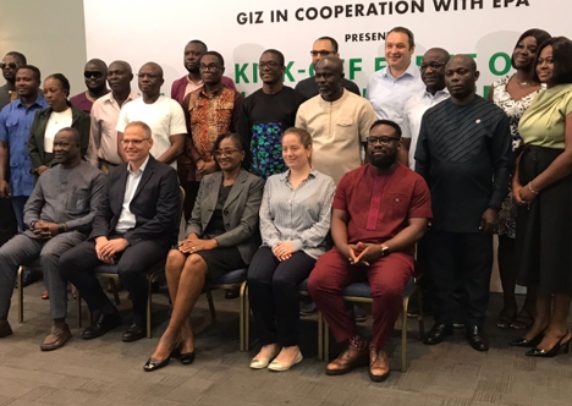Dignitaries in a group photograph
The Environmental Protection Authority (EPA), in collaboration with the German Development Cooperation (GIZ) and the Energy Commission, has launched the Ghana Green Cooling Programme (GGCP), a major initiative to transform the country’s air conditioning sector into a climate-friendly, energy-efficient, and sustainable industry.
The programme, funded by the Switzerland-based KliK Foundation under Article 6.2 of the Paris Agreement, seeks to cut greenhouse gas emissions by promoting the use of “green” split air conditioners (ACs).
These units use the natural refrigerant R290, which is climate-friendly and consumes far less energy than conventional appliances.
The GGCP focuses on three key areas, namely, financial incentives, capacity building, and end-of-life management.
The programme will provide subsidies for up to 150,000 climate-friendly ACs to make them affordable for households and businesses, starting with incentives for the first 5,000 units.
It will also train AC trainers and technicians nationwide on safe installation, maintenance, and lifecycle management, while supporting the collection, recycling, and disposal of old ACs and refrigerants.
The Chief Executive of EPA, Prof. Nana Ama Browne Klutse, said demand for cooling in Ghana is rising sharply due to urbanisation and population growth, with the split AC sub-sector alone responsible for about 80% of national emissions.
“To address this, Ghana’s Green Cooling project aims to shift the sector towards low-carbon technologies. Beyond environmental benefits, it will also reduce electricity bills, create jobs, and enhance technical skills across the country,” she said.
Prof. Klutse stressed that the programme is as much about building a sustainable cooling ecosystem as it is about replacing equipment.
Gunnar Wegner of GIZ’s Sustainable Energy and Climate Cluster said Ghana is making a significant step towards a low-carbon future.
He noted that the Kigali Amendment to the Montreal Protocol had placed pressure on the refrigeration industry to adopt refrigerants with lower global warming potential, adding that GIZ has supported Ghana’s cooling sector for more than a decade through awareness and technology adoption.
Executive Secretary of Energy Commission, Eunice Biritwum, highlighted the Commission’s role in promoting green cooling by educating stakeholders on the Most Economically Advantageous Tender (MEAT) process, which considers both cost and environmental impact.
“The Commission remains committed to working with partners to foster sustainable cooling practices, helping Ghana build a cleaner and cooler future,” she said.
BY Prince Fiifi Yorke


